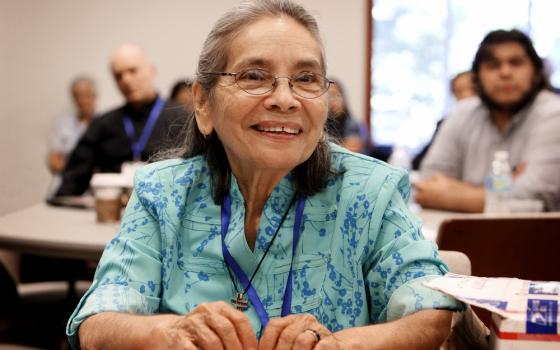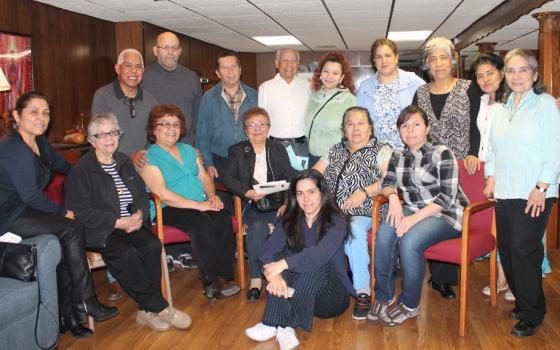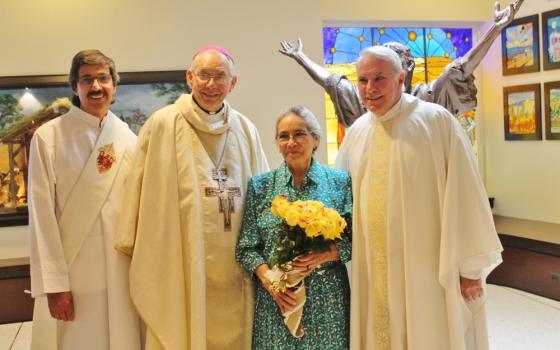In 1956, when she was 16 years old, Sr. Dominga Zapata followed her mother and brother to the United States from Lajas, Puerto Rico, which she described as a religious farm town.
Now, the Helper of the Holy Souls sister lives in Chicago, where she primarily leads retreats and runs leadership courses and is best known for her work in Hispanic ministry. At the 25th anniversary banquet dinner June 25 for the National Catholic Council for Hispanic Ministry (NCCHM ), which she co-founded, Zapata was honored as recipient of the William Sadlier Dinger Award for Service in Catechetical and Hispanic Ministry.
"I can only give what I receive," she said in her keynote address. "The more open one is to receive, the more gifted one is to give."
That Hispanics in the United States constitute 60 percent of Catholics younger than 18 does not escape Zapata, who talked to Global Sisters Report about what Hispanic ministry should look like today and what this demographic can do for the church. She also talked about the fifth Encuentro — a four-year-long process engaging Hispanics in dialogue at the parish, diocesan, regional and national level.
GSR: How has Hispanic ministry evolved since you got involved?
Zapata: Early in religious life, when the church began to be more aware of [the Hispanic Catholic] presence, I used to say at different conferences, 'You have to know and appreciate the culture of the people to be able to invite [them].' But I don't think there's still as much consciousness in the religious community in the U.S.; I don't think religious communities realize the richness they could bring to the community by reaching out to diversity.
The reality is that we are the youngest members in the Catholic church today, so the leadership of the church will have to come from our cultural background, from our communities. Most of our young people are not undocumented immigrants. They are born here or were raised [here] and got into DACA. But I think the church as a whole does not seem to see us as equal. It seems to continue to see us as they need.
This was my own contribution in founding NCCHM and some of the other organizations, that I was the one instrumental in bringing in the organization of diocesan directors. I didn't want that organization to be just directors, but all the employees in Hispanic ministry at the diocesan level, so we can work together and become more crucial, more in church mentality, not just Hispanic ministry.
We were hoping to help our vocation promoters think on a cultural vocation — everybody has a cultural vocation — and as we foster vocations in general, they're going to be more aware of religious and priests. At this time, the church does not primarily depend on priests and sisters like it did in history. It has to be primarily lay. Because religious women are consecrated lay, not clergy, we are closest to that development of the laity vocation.
What can the U.S. church gain from the Latino charism?
Primarily, the communal dimension, the family dimension. We are very communitarian. So being in a country whose culture is very individualistic, that also influences the church — the church is part of that culture. I feel that the Catholic church has been deprived of being open to that diversity and that communitarian aspect. I feel that with African-Americans and Filipinos, they are the same. So how does the Catholic church in the U.S. reach out to those bonds?
For us, we must also be open to give value to the individual, because sometimes the community aspect is so dominant, that doesn't allow very much for individuals to develop their own personalities, their own decision-making, having a positive image of themselves.
Looking ahead at the fifth Encuentro, tell me what discussions you most look forward to or issues you hope come up.
My main concern with the preparation of Encuentro, apart from the initial organizing or developing, is that we have so many people in leadership in Hispanic ministry who haven't lived the experiences [of the first four Encuentros], some who hadn't even read the outcomes of it, haven't experienced the difference that it had made in Hispanic ministry.
For example, at the first Encuentro [which began in 1971], there weren't really Hispanic leaders. At that time, we were in the background. We were from the outside, talking to the church. By the second Encuentro [in the mid-1970s], no longer was that the reality. We had awakened all those people, and of course, the primary leaders were the Hispanic priests and sisters because we hadn't even gone to the laity development. We took over. We had done a tremendous amount of awakening in the conference of bishops and had Hispanic bishops assigned.
By the time we had the third Encuentro [in the mid-1980s], we were no longer thinking just Hispanic ministry: We went from assimilation to integration. We wanted to be a gift to the church, we wanted the communitarian dimension that was part of culture and heritage to offer to everybody, so we declared that. Also, for the first time, we had a plan. We're more of a spontaneous culture, but we said, 'No, if we have to relate to a larger culture, we have to learn how to organize ourselves.'
But since '87, when the [third Encuentro's] pastoral plan came out, you wonder, how many took that plan seriously? Here in Chicago, I had the experience.
Right after the first Encuentro, we developed a structural plan because we didn't have anything here in Chicago, so we developed an office that would gather and continue to develop and assume a lot of the responsibility as a church. You can't just sit there and wait for the church to respond; we are the church.
Hundreds of people were involved in developing that plan; more than 2,000 people participated in the diocesan Encuentro to be able to highlight the context of the plan. And basically, nothing of that plan or very little of that plan was given attention.
As we go into the fifth Encuentro, I think that the basis of good decisions is starting with realities: where we have been, where we are, and why we are where we are. This moment is not going to come back, and if we don't do it today, tomorrow will be yesterday.
The first thing we have to do is integrate our own generations of young adults as young leaders, who we have lost in the meantime. How are we going to pass the torch and who do we pass it to if we don't even know each other? The emphasis is going to be on young adults.
But what young adults are we talking about, from the church? How have we been developing and nourishing a relationship with adult professionals? And how the church can be concerned to nourish faith, so they're not just Hispanic professionals, but Catholic professionals.
I look forward to the fifth Encuentro. I have hope. Even if it is minimal.
How do you see the Holy Spirit in your work?
I always consider myself a spoiled child of God. I don't plan everything I do. I think God puts me in the right place at the right moment with the right people, and I just go along. I feel that I'm that kind of leader, that, yes, I lead, but because I'm being led. With the charism of the Helpers, I'm not required to do this and nothing else; I think the rest of the Helpers never know what I'm up to. But that seems to be our charism. We know and we don't know exactly what the others are doing, but we know they are doing.
I got certified as a spiritual accompanier because I feel with the laity, if we don't give them a spirituality of discipleship, they're going to be like everybody else, competing with one another, arguing with one another.
The majority of laypeople will be married people. That's why I love accompanying in the permanent deaconate, because I accompany the couple. If they don't grow together in spiritual union with God, his ministry as a deacon, his leadership — it's not going to be effective. You can't preach what you don't live.
[Soli Salgado is a staff writer for Global Sisters Report. Her email address is [email protected]. Follow her on Twitter: @soli_salgado.]



